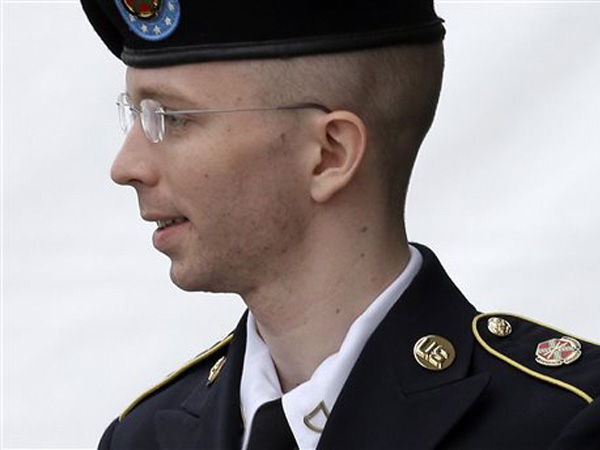WikiLeaks on Manning verdict: ‘Extremism’

In this July 30, 2013 file photo, Army Pfc. Bradley Manning is escorted out of a courthouse in Fort Meade, Md. after receiving a verdict in his court martial. Few Americans in living memory have emerged from obscurity to become such polarizing public figures—admired by many around the world, fiercely denigrated by many in his homeland. AP
WikiLeaks founder Julian Assange called U.S. soldier Bradley Manning’s espionage conviction an episode of “national security extremism” Tuesday, while other supporters expressed relief that he was acquitted of the most serious charge — aiding the enemy.
Among Manning’s critics, members of a Congress intelligence committee said justice was served.
The charge of aiding the enemy would have carried a potential life sentence, but Manning was convicted on other counts that, together, could also mean a life behind bars. Manning faces up to 136 years in prison if given maximum penalties.
His sentencing hearing starts Wednesday.
Manning has acknowledged giving WikiLeaks more than 700,000 battlefield reports and diplomatic cables. He has said he leaked the material to expose U.S military “bloodlust” and diplomatic deceitfulness but did not believe his actions would harm the country.
Assange, whose website helped Manning expose U.S. secrets to the world, called the verdict “a dangerous precedent and an example of national security extremism.”
“This has never been a fair trial,” he told reporters at the Ecuadorean Embassy in London, which is sheltering him.
Glenn Greenwald, the journalist who first reported former U.S. intelligence contractor Edward Snowden’s leaks of National Security Agency surveillance programs, said Manning’s acquittal on the charge of aiding the enemy represented a “tiny sliver of justice.”
Anatoly Kucherena, the Russian lawyer who’s been working with Snowden, said: “All cases are individual. We shouldn’t take the Manning case and compare it to Snowden.”
Christian Stroebele, a German lawmaker for the opposition Green Party, tweeted: “Manning has won respect by uncovering the U.S.’s murderous warfare in Iraq.”
In Washington, the Republican and Democratic leaders of the House Intelligence Committee joined in a statement declaring “justice has been served today.”
Rep. Howard “Buck” McKeon, chairman of the House Armed Services Committee, welcomed the outcome.
“Bradley Manning endangered the security of the United States and the lives of his own comrades in uniform when he intentionally disclosed vast amounts of classified data,” he said. “His conviction should stand as an example to those who are tempted to violate a sacred public trust in pursuit of notoriety, fame, or their own political agenda.”
But the advocacy group Reporters Without Borders said the verdict was a chilling warning to whistleblowers, “against whom the Obama administration has been waging an unprecedented offensive.” It said the verdict threatens the future of investigative journalism because intimidated sources might fall quiet.
Another advocate of less government secrecy, Steven Aftergood of the Federation of American Scientists, questioned whether the implications will be so dire, given the extraordinary nature of the Manning case.
“This was a massive hemorrhage of government records, and it’s not too surprising that it elicited a strong reaction from the government,” Aftergood said.
“Does that mean that every leak from every journalist is likely to do the same?” he asked. “No it doesn’t. Most journalists are not in the business of publishing classified documents, they’re in the business of reporting the news, which is not the same thing. This is not good news for journalism, but it’s not the end of the world, either.”
Daniel Ellsberg, whose sensational leak of the Pentagon papers in the early 1970s exposed U.S. government lies about the Vietnam War, said Manning’s acquittal on aiding the enemy limits the chilling consequences of the WikiLeaks case on press freedoms.
“American democracy just dodged a bullet, a possibly fatal bullet,” Ellsberg said. “I’m talking about the free press that I think is the life’s blood of the democracy.”
Outside the courtroom, Manning supporters applauded his lawyer, David Coombs, and shouted “thank you.”
“Today is a good day,” Coombs said, “but Bradley is by no means out of the fire.”
Many supporters wore black T-shirts with “truth” on them to show they consider him a whistleblower trying to expose government misconduct.
“The government’s priorities are upside down,” Widney Brown, senior director of international law and policy for Amnesty International, said at the scene.
Officials have “refused to investigate credible allegations of torture and other crimes under international law despite overwhelming evidence,” Brown said, but they “decided to prosecute Manning, who it seems was trying to do the right thing — reveal credible evidence of unlawful behavior by the government.”
“It seems clear that the government was seeking to intimidate anyone who might consider revealing valuable information in the future,” said Ben Wizner of the ACLU Speech, Privacy & Technology Project.